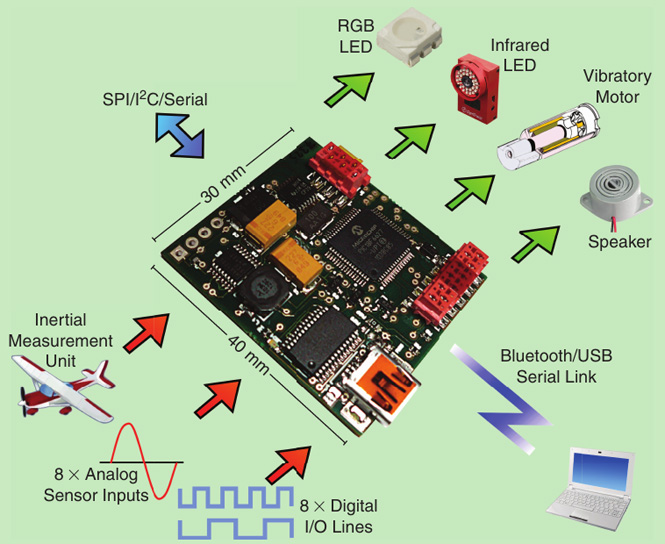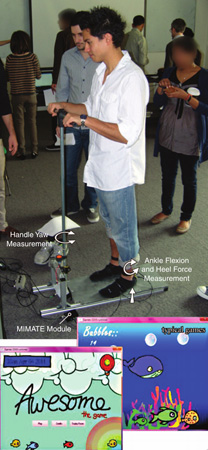Learning to Design Rehabilitation Devices Through the H-CARD Course
By Nick Roach, Asif Hussain, and Etienne Burdet
NOTE: This is an overview of the entire article, which appeared in the November/December 2012 issue of the IEEE Pulse magazine.
Click here to read the entire article.
Undergraduate students at Imperial College, London UK participate in the development of innovative games over a short one-term course focused on the design of assistive and rehabilitative devices. They are able to create and implement projects in such a short time through the use of a custom-designed hardware module known as MIMATE, which has been designed as a wireless platform with a variety of embedded sensor, processing, and control functions and interfaces to other, external devices. Associated firmware and a C++ class have been developed also, to reduce the amount of low-level software skills needed to develop a project.

Figure 1. A basic MIMATE module and its interfaces. The sensing and stimulus hardware that can be connected to this compact module yields a versatile platform for the development of rehabilitative and assistive devices.
This module is the primary platform for a 30 hour course (H-CARD), in which teams of students from engineering, computer science, and medical backgrounds are taught the practical mechanical, electrical, and software-development skills required for the design and implementation of systems for rehabilitation systems and assistance. Use of techniques for rapidly prototyping are encouraged in the course, the goal of which is the successful production of a working prototype.

Figure 2: A participant playing a computer game, via a scooter controller. Through a number of
sensors and the MIMATE, measurements of posture were translated to control a variety of games.
The article describes characteristics of the MIMATE module and its sensor and stimulus components. Significantly, the authors report that the hardware cost of the module is less than €100. The article presents the objective and realization of the H-CARD course, plans for which include its use in other universities. Photos and descriptions of three projects developed by students are included in the article.
ABOUT THE AUTHORS
Nick Roach (n.roach@imperial.ac.uk), Asif Hussain (asif.hussain09@imperial.ac.uk), and Etienne Burdet (eburdet@imperial.ac.uk) are with the Department of Bioengineering, Imperial College London, United Kingdom.






